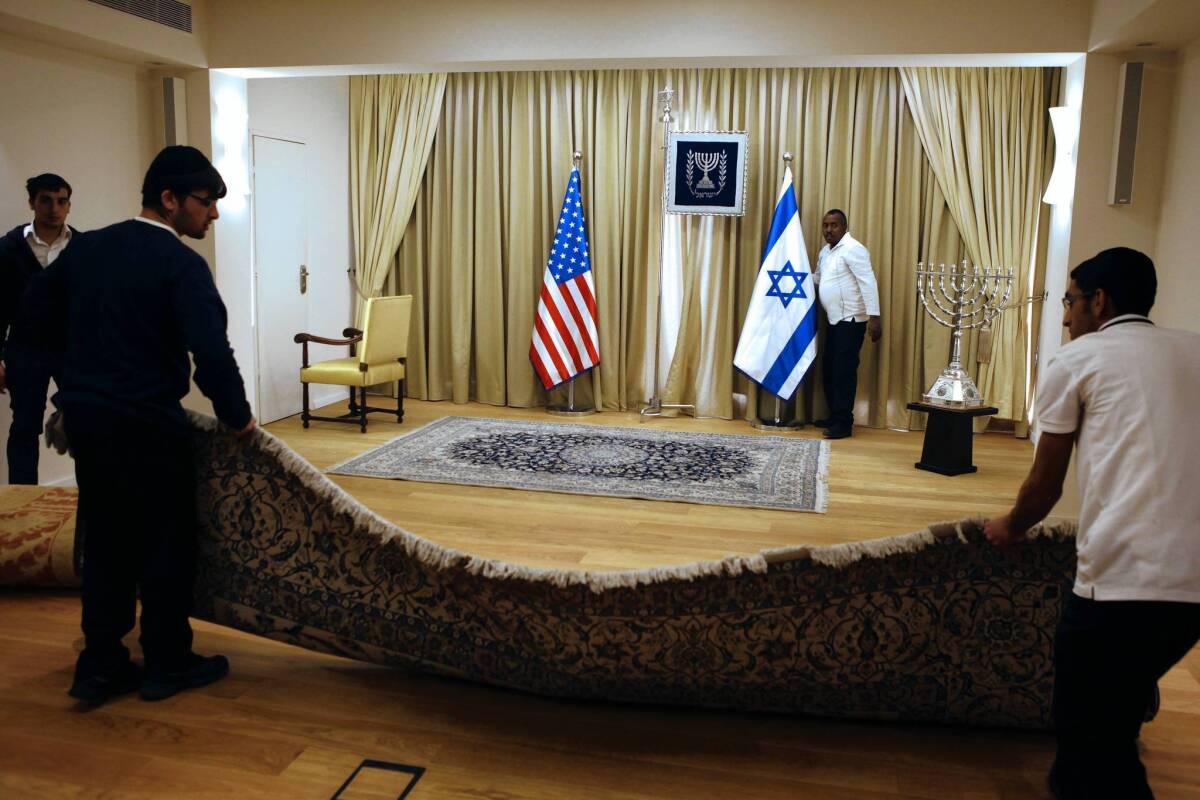Obama and Netanyahu will try for a thaw during Israel visit

JERUSALEM — As President Obama prepared for his first official trip to Israel, he made a point of referring to Prime Minister Benjamin Netanyahu by his affectionate nickname, “Bibi,” in a TV interview.
In Israel, Netanyahu geared up to greet Obama on Wednesday at the airport in Tel Aviv, ensuring that the first images show the two reelected leaders smiling and shaking hands.
But after four years of public clashes, private entreaties and largely unsuccessful attempts to outmaneuver each other, no amount of backslapping is likely to alter perceptions that the personal rapport between Obama and Netanyahu has ranged from awkward to dysfunctional.
The odd couple now will spend nearly three days trying to thaw their chilly relationship.
“They have learned the limits of what they can do vis-a-vis the other, and they both paid a price for their misjudgments of each other,” said Ed Rettig, director of the Israeli office of the American Jewish Committee, an advocacy group.
To be sure, relations between the United States and Israel remain strong despite the high-level sniping, with close cooperation on security, intelligence sharing and military affairs. The White House says Obama has spent more time, on the phone or in person, with Netanyahu than with any other world leader.
That hasn’t always helped. In 2011, a microphone picked up Obama grousing about how much time he had to spend talking with the prime minister. And Netanyahu lectured a grim-faced Obama on Jewish history at an Oval Office news conference that same year.
Most experts say the U.S.-Israeli relationship is too deep and strategic to be derailed by bickering at the top. President George H.W. Bush and Prime Minister Yitzhak Shamir clashed over Israeli settlements in the late 1980s, although relations later improved.
“Chemistry is for chemists,” said Eytan Gilboa, political science professor at Israel’s Bar-Ilan University. “In international relations, it’s about interests. If the interests are present, the chemistry is irrelevant. And if the interests aren’t there, no chemistry will help.”
Obama seemed to echo that sentiment last week in an interview with Israel’s Channel 2. He called his relationship with Netanyahu “businesslike” and said that despite all the attention to their differences, they’ve proved they can work effectively together.
“We get stuff done,” Obama said.
For now, both leaders are expected to be on their best behavior on a schedule that includes a joint news conference, a closed-door meeting and a private dinner at the prime minister’s residence.
Obama is not bringing demands for a freeze on construction of Israeli settlements in the West Bank or Jerusalem or other conditions that angered Netanyahu during the president’s first term. Obama’s aides portray the visit as heavy on imagery and messaging, not policy initiatives.
Still, Obama is scheduled to meet Israeli opposition leader Shelly Yachimovich. Israelis will listen to Obama’s public remarks for any references to touchy topics such as settlement construction, or calls for a Palestinian peace treaty based on 1967 borders with mutually agreed-upon land swaps.
For his part, Netanyahu is trying to ensure that Obama will not be blindsided by announcements of new settlement projects in the West Bank or the Jerusalem area, like the one that embarrassed Vice President Joe Biden during a visit to Israel in 2010.
Yet many will watch to see whether Netanyahu uses a joint news conference to reassert Israel’s claim over all of Jerusalem, which the U.S. does not recognize, or to criticize the effectiveness of U.S.-led sanctions against Iran, as he has in the past.
After he took office in 2009, Obama publicly pushed Netanyahu to freeze settlement construction and to do more to support a two-state solution. The tactics backfired: They cost Netanyahu politically at home and failed to restart peace talks.
“That relationship started out on the wrong foot,” said former Netanyahu advisor Dore Gold, now president of the Jerusalem Center for Public Affairs.
To Obama and his aides, Netanyahu appeared ungrateful for increased U.S. security coordination and funding. And during last year’s election, the prime minister was widely seen as working with Republicans to make Obama appear hostile to Israel and thus undercut the president’s reelection prospects.
In an hourlong meeting at the White House on March 7, Obama reassured leaders of major Jewish organizations that he understood the politics and didn’t hold what occurred during the campaign against Netanyahu, according to people who were present.
White House aides say the two men have proved that they aren’t afraid to speak honestly to each other even if they aren’t best friends.
Some wonder if the personality clash stems from similarities rather than differences. Both men are intellectuals who enjoyed charmed political careers at a young age.
“They’re both golden boys,” Rettig said. “It’s like magnets when similar poles repel. The two men are very much alike in many ways.”
More to Read
Sign up for Essential California
The most important California stories and recommendations in your inbox every morning.
You may occasionally receive promotional content from the Los Angeles Times.











